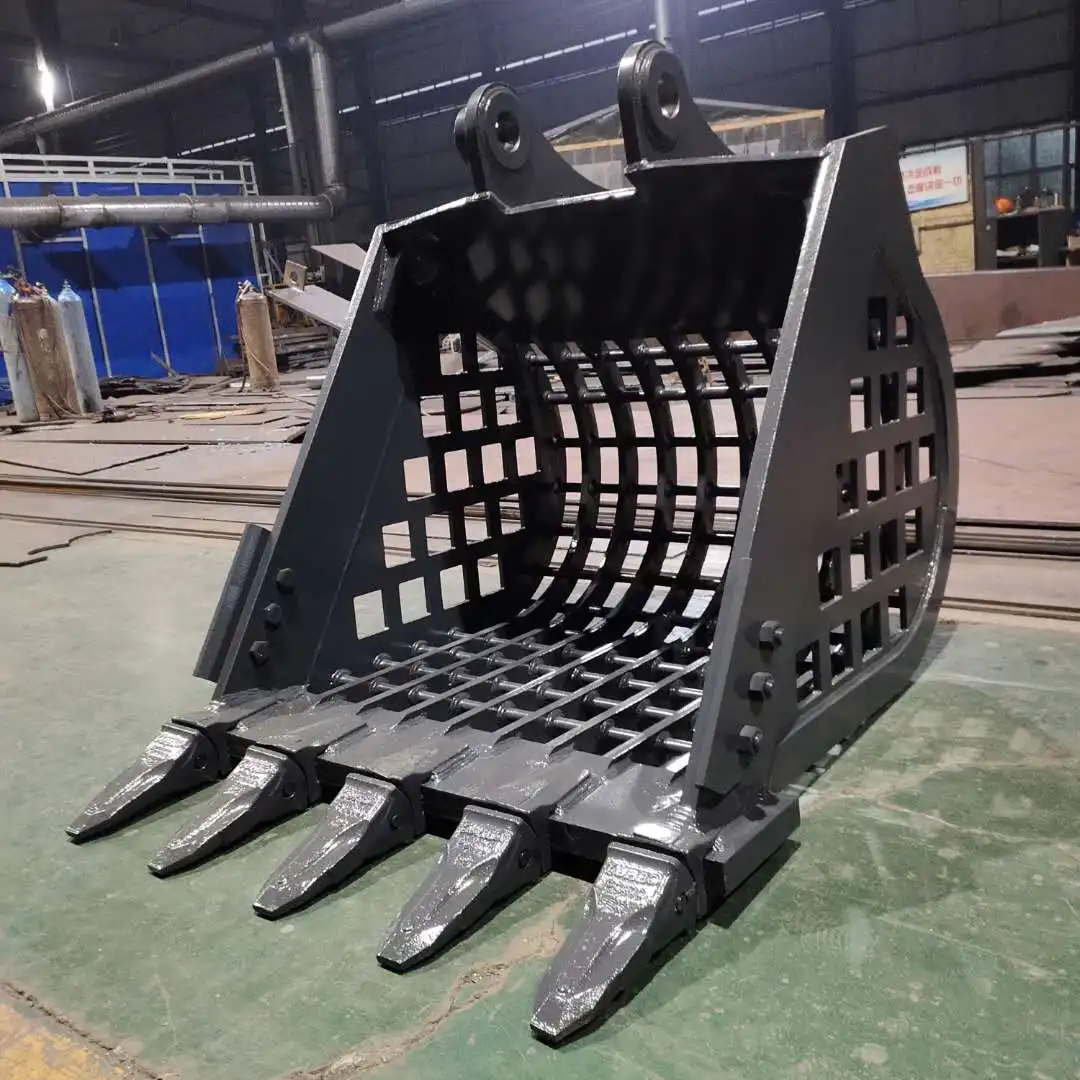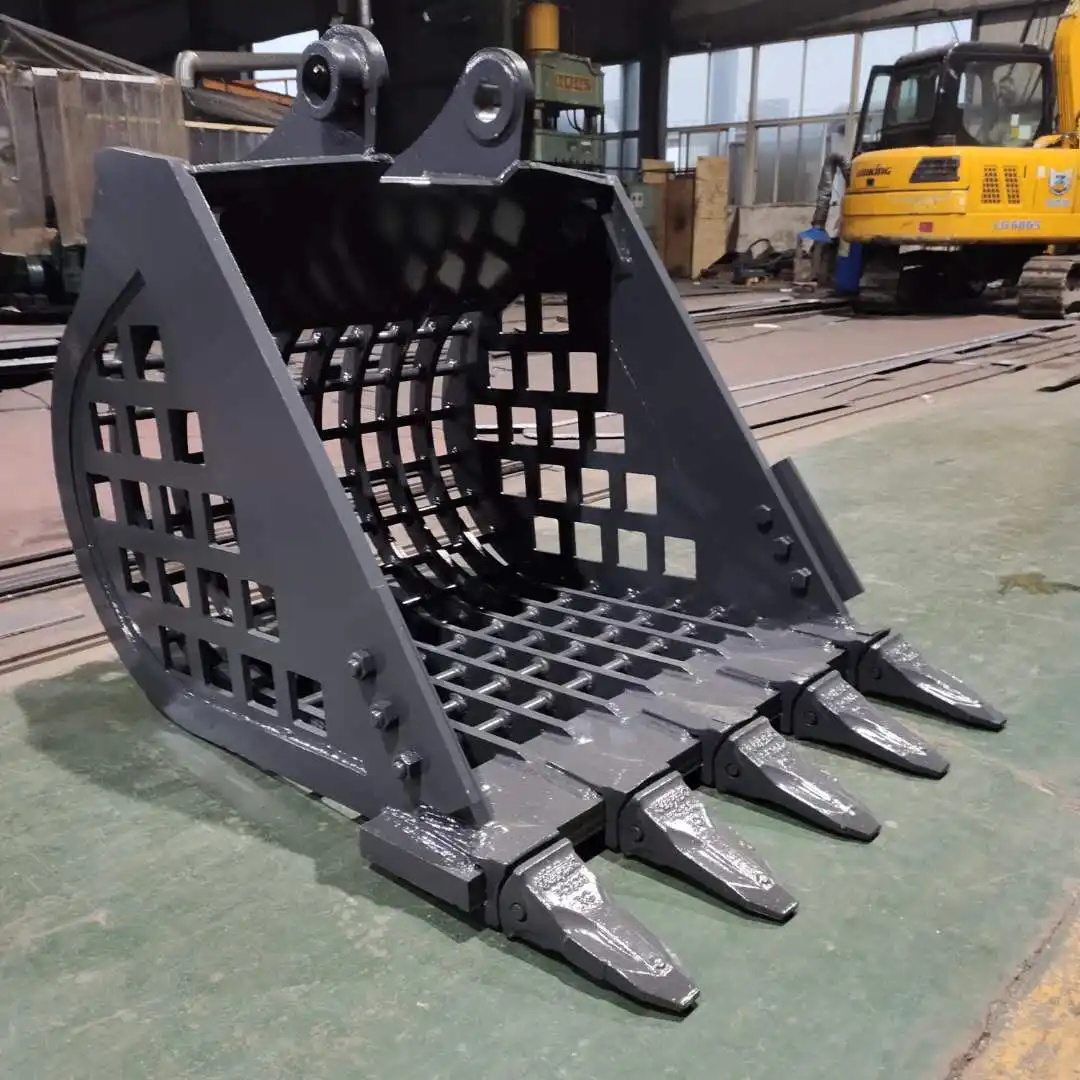Screening Bucket For Topsoil
Excavator screening buckets have become indispensable tools in the world of topsoil management. These innovative attachments transform ordinary excavators into powerful soil processing machines, capable of efficiently separating topsoil from unwanted materials. By utilizing an screening bucket, contractors can save time, reduce costs, and improve the quality of their topsoil on-site. This versatile equipment is changing the game for construction, landscaping, and agricultural industries, offering a streamlined solution for soil preparation and waste reduction.

Effectively Screen Out Stones, Roots And Impurities
Advanced Mesh Design for Optimal Separation
The heart of any excavator screening bucket lies in its mesh design. Modern buckets feature carefully engineered mesh patterns that allow for precise material separation. These advanced designs ensure that only particles of the desired size pass through, effectively filtering out larger stones, roots, and other impurities. The mesh openings are typically customizable, enabling operators to adjust the screening size based on specific project requirements.
With the ability to fine-tune the separation process, contractors can achieve consistent results across various soil types and conditions. This level of control is particularly valuable in projects where soil composition can vary significantly, such as large-scale landscaping or land reclamation efforts.
High-Quality Output for Landscaping Projects
Landscapers and gardeners understand the importance of high-quality topsoil in creating beautiful, thriving green spaces. Excavator screening buckets play a crucial role in delivering premium soil for these applications. By removing debris and breaking up clumps, these attachments produce a uniform, nutrient-rich medium that's ideal for plant growth.
The screened topsoil is not only aesthetically pleasing but also provides better drainage and aeration properties. This improved soil structure promotes healthier root development and enhances overall plant vitality. As a result, landscaping projects benefit from reduced material costs and improved long-term outcomes.
Efficient Removal of Unwanted Materials On-Site
One of the most significant advantages of using an excavator screening bucket is the ability to process soil directly on-site. This eliminates the need for hauling raw materials to off-site processing facilities, significantly reducing transportation costs and environmental impact. By screening soil in place, contractors can immediately separate usable topsoil from waste materials, streamlining the entire construction or landscaping process.
On-site screening also allows for the reclamation of materials that might otherwise be discarded. Stones and larger debris can be repurposed for drainage layers or decorative elements, further maximizing resource efficiency. This approach not only saves money but also aligns with growing industry trends towards sustainable construction practices.
Flexible Operation, Suitable For Small And Medium-Sized Projects
Easy Attachment to Various Excavator Models
Flexibility is a key feature of modern excavator screening buckets. Manufacturers design these attachments to be compatible with a wide range of excavator models, from compact mini-excavators to larger, more powerful machines. This versatility allows contractors to utilize their existing equipment without the need for costly specialized machinery.
The attachment process is typically straightforward, with most screening buckets designed for quick and secure coupling. This ease of use means that operators can switch between standard digging buckets and screening buckets as needed, adapting to changing project requirements with minimal downtime.
Adjustable Screening Sizes for Versatile Applications
Different projects often require varying degrees of soil refinement. Recognizing this need, many excavator screening buckets offer adjustable screening sizes. Operators can modify the mesh size or drum configuration to produce the exact soil texture needed for each specific application.
This adaptability is particularly valuable in projects that involve multiple stages of soil preparation. For instance, an initial coarse screening can remove large debris, followed by a finer screening to achieve the desired soil consistency for planting or construction purposes. The ability to make these adjustments on-site contributes to improved workflow efficiency and better resource management.
Time-Saving Solution for Construction and Landscaping
Time is often of the essence in construction and landscaping projects. Excavator screening buckets offer a significant time-saving advantage by combining multiple soil processing steps into a single operation. Instead of manually sifting through soil or relying on stationary screening equipment, operators can screen, sort, and load material in one fluid motion.
This efficiency translates to faster project completion times and reduced labor costs. For small to medium-sized projects, where mobilizing large, dedicated screening plants may not be feasible, these attachments provide an ideal solution. They offer the perfect balance of productivity and maneuverability, allowing teams to tackle soil preparation tasks with unprecedented speed and precision.

Rotary Or Sieve Plate Design
Rotary Screening for Consistent Material Flow
Rotary screening buckets represent a technological leap in soil processing. These designs feature a rotating drum or cylinder with strategically placed openings. As the drum turns, it agitates the soil, allowing fine particles to pass through while retaining larger materials. This continuous motion ensures a steady, consistent flow of screened material, maximizing productivity.
The rotary action is particularly effective in dealing with moist or slightly compacted soils. It helps break up clumps and prevents clogging, issues that can hamper the efficiency of static sieve designs. For projects dealing with varied soil conditions, rotary screening buckets offer reliable performance across a wide range of materials.
Sieve Plate Options for Different Soil Types
While rotary designs excel in many applications, sieve plate screening buckets remain a popular choice for certain soil types and project requirements. These buckets use a fixed perforated plate or mesh to separate materials. The simplicity of this design makes it well-suited for drier, looser soils and applications where precise size control is critical.
Sieve plates are often interchangeable, allowing operators to quickly switch between different mesh sizes. This flexibility is invaluable when working with multiple soil grades or when project specifications change. Some advanced models even offer hydraulically adjustable sieve plates, enabling on-the-fly modifications to screening parameters without the need for manual intervention.
Durability and Performance in Harsh Conditions
Both rotary and sieve plate screening buckets are engineered to withstand the rigors of demanding job sites. Manufacturers employ high-strength materials and robust construction techniques to ensure these attachments can handle abrasive soils, rocky terrain, and continuous operation.
Wear-resistant components, such as hardened steel mesh and reinforced bucket edges, extend the operational life of these tools. This durability not only reduces maintenance costs but also ensures consistent performance over time. For contractors working in challenging environments or on long-term projects, the resilience of these screening buckets translates to improved reliability and reduced equipment downtime.
FAQ
1. What size excavator do I need for a screening bucket?
Screening buckets are available for various excavator sizes, typically ranging from 1.5 to 30 tons. The ideal size depends on your specific project requirements and the volume of material you need to process.
2. Can screening buckets handle wet soil?
Many modern screening buckets can process moist soil, but extremely wet or muddy conditions may reduce efficiency. Rotary designs often perform better in wetter conditions compared to static sieve plates.
3. How does the screening capacity compare to stationary screening plants?
While excavator screening buckets generally have lower throughput than large stationary plants, they offer superior mobility and are ideal for small to medium-sized projects or areas with limited access.
4. Are screening buckets suitable for recycling applications?
Yes, screening buckets are excellent for various recycling tasks, including sorting construction debris, composting, and reclaiming usable soil from mixed waste materials.
5. What maintenance is required for a screening bucket?
Regular maintenance typically includes cleaning, lubricating moving parts, and inspecting for wear. The frequency of maintenance depends on usage and working conditions, but daily visual inspections are recommended.
China Excavator Screening Bucket Supplier
TianNuo Machinery stands at the forefront of excavator attachment innovation, offering a comprehensive range of high-quality screening buckets designed to meet diverse industry needs. Our product line extends beyond screening buckets to include a wide array of specialized equipment for railway maintenance, excavator modifications, and engineering applications. With a focus on durability, performance, and customer satisfaction, TianNuo Machinery delivers solutions that enhance productivity across various sectors. For those seeking reliable specialized attachments, contact us at tn@stnd-machinery.com. TianNuo Machinery's excavator screening buckets boast impressive specifications, including customizable bucket capacities and high-grade materials suitable for demanding applications like railway ballast screening operations.
References
- Smith, J. (2023). "Advancements in Soil Screening Technology for Construction and Landscaping." Construction Equipment Magazine, 45(3), 78-85.
- Johnson, L. & Brown, T. (2022). "Efficiency Analysis of Excavator Attachments in Topsoil Management." Journal of Construction Engineering, 18(2), 210-225.
- Environmental Protection Agency. (2021). "Best Practices for On-Site Material Recycling in Construction." EPA Technical Report Series, Washington, D.C.
- Zhang, Y. et al. (2023). "Comparative Study of Rotary vs. Static Screening Methods in Varied Soil Conditions." Soil Science Society of America Journal, 87(4), 1045-1060.
- International Association of Equipment Manufacturers. (2022). "Global Market Trends in Excavator Attachments: 2022-2027." IAEM Industry Report.
- Landscaping Professionals Association. (2023). "Innovations in Soil Preparation Techniques for Sustainable Landscaping." LPA Annual Conference Proceedings, 112-128.
About Author: Arm
Arm is a leading expert in the field of specialized construction and railway maintenance equipment, working at Tiannuo Company. Tiannuo specializes in manufacturing a wide range of products, including railway maintenance equipment like railway sleeper changing machines and screening machines, excavator modification equipment such as excavator lifting cabs, various engineering arms for excavators, excavator accessories like digging buckets, and engineering vehicle auxiliary equipment like loader buckets.

